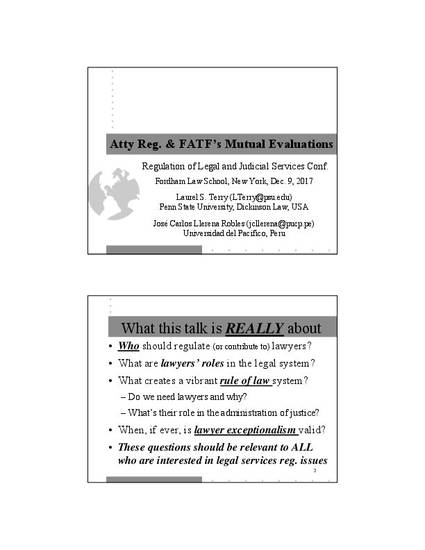
Presentation
Lawyer Regulation, AML, and FATF's Mutual Evaluations
Fordham University School of Law
(2017)
Abstract
These presentation slides were used at the December 2017 Fordham Regulation of Legal and Judicial Services Conference andwill be the basis for our forthcoming article in Volume 41 of the Fordham J. of International Law, entitled "The Relevance of FATF's Recommendations and the 4th Round of Mutual Evaluations to the Legal Profession."These slides focus on FATF’s 4th round of “Mutual Evaluations, which currently are underway. During these mutual evaluations, FATF-affiliated countries examine each other’s compliance with the FATF Recommendations and recommend follow-up action for those countries whose lawyer regulation or implementation is not in compliance.
As the slides indicate, most countries in the world have agreed to abide by the FATF Recommendations. The FATF Recommendations characterize the legal profession as "DNFBPs" and - generally speaking - recommend similar AML regulation for lawyers as other DNFBPs such as casinos, precious metal dealers, and real estate brokers, among others. After providing information about the FATF Recommendations and Mutual Evaluations, these slides provide information about the schedule for the 4th Round of Mutual Evaluations and show how the legal profession has fared in the Mutual Evaluations conducted so far (poorly). The slides refer to the underlying article which explains how the legal professions in 3 different countries prepared for their Mutual Evaluations. The slides and the article offer advice to countries whose Mutual Evaluation is upcoming. Among other things, they note the competing narratives that have emerged with respect to AML regulation of lawyers (the lawyer as sieve narrative and the lawyer as "Atlas" narrative). These slides encourage the legal profession to understand these differing perspectives and encourage legal profession representatives to educate themselves about the FATF Mutual Evaluation process so that they can take steps to ensure that each country's AML lawyer regulation achieves the proper balance given that country's history and context. These slides note, for example, the differing situation in each of the author's home countries (the US and Peru). The slides urge lawyers to play an active role in the FATF Mutual Evaluation conversations in order to better ensure that each country has a vibrant rule of law system, with lawyers (and lawyer regulation) playing an appropriate role in the administration of justice.
For the law review article based on this presentation, see Laurel S. Terry and José Carlos Llerena Robles, The Relevance of FATF’s Recommendations and Fourth Round of Mutual Evaluations to the Legal Profession, 42 Fordham Int’l L. J. 627 (2018), https://works.bepress.com/laurel_terry/87/
See also Laurel S. Terry, U.S. Legal Profession Efforts to Combat Money Laundering and Terrorist Financing (2015), https://works.bepress.com/laurel_terry/29/
Keywords
- FATF,
- Mutual Evaluation,
- 40 Recommendations,
- money laundering,
- AML,
- lawyers,
- legal profession,
- international,
- soft law,
- Financial Action Task Force,
- lawyer as sieve,
- lawyer as Atlas,
- CFT,
- AML-CFT
Publication Date
December, 2017
Location
New York
Citation Information
42 Fordham International Law Journal 627 (2018)
